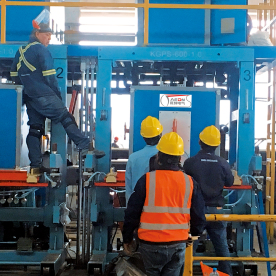****
In recent years, advancements in welding technology have significantly transformed the landscape of metal fabrication, especially in manufacturing environments that demand high precision and efficiency. Among the most innovative developments is the High-Power Solid State HF Welder, a piece of equipment that has quickly gained popularity in various industries. This article delves into the features, benefits, and applications of high-power solid-state HF welders, illuminating their role in shaping the future of welding processes.
High-frequency (HF) welding is a process that utilizes high-frequency electromagnetic fields to generate heat in the metal surfaces being joined. This technique has long been utilized in various sectors, such as automotive, aerospace, and electronics. However, the advent of solid-state technology has revolutionized HF welding, providing greater power and efficiency compared to traditional vacuum tube systems. Solid-state technology employs transistors and other semiconductor devices, which significantly enhances reliability and reduces maintenance needs.
One of the chief advantages of high-power solid-state HF welders is their impressive power output. These machines can operate at the levels required for heavy-duty applications without sacrificing quality. This increased power capability enables manufacturers to weld thicker materials and larger components, expanding their operational capabilities. Consequently, high-power solid state HF welders become indispensable tools in industries that require robust, long-lasting welds.
Another notable benefit of these welders is their ability to maintain consistent quality and control over the welding process. Solid-state devices allow for rapid adjustments to welding parameters, such as frequency and power output. This flexibility is crucial for industries where precision is paramount, allowing for more accurate welds with minimal defects. Compared to older technologies, solid-state HF welders offer superior control over heating cycles, reducing the risk of warping or other forms of distortion in the welded materials.
Furthermore, high-power solid-state HF welders exhibit outstanding efficiency levels. The energy consumption of solid-state systems is lower than that of traditional tube-based systems, which leads to significant cost savings in long-term use. This efficiency not only pertains to energy but also relates to the overall welding time. Manufacturers can achieve faster production cycles with high-power solid-state HF welders, ensuring peak productivity while meeting demanding deadlines.

Revolutionizing Metal Fabrication: The Impact of High-Power Solid State HF Welders in Modern Industries
The significant reduction in maintenance requirements is yet another attractive aspect of these welders. Traditional HF welders often rely on vacuum tubes that are prone to wear and require periodic replacements. In contrast, high-power solid-state systems are more robust and less susceptible to failure, allowing for longer operational periods between service interventions. This durability leads to reduced downtime and lower operational costs, making solid-state systems an economically appealing choice for businesses.

Revolutionizing Metal Fabrication: The Impact of High-Power Solid State HF Welders in Modern Industries
Moreover, the versatility of high-power solid-state HF welders is noteworthy. These machines can tackle a wide range of materials, including metals, plastics, and composites. This adaptability opens doors for various applications such as automotive parts assembly, pipe welding, and the manufacturing of consumer electronics. The ability to efficiently work with diverse materials positions businesses to easily diversify their production lines and respond to market demands promptly.

Revolutionizing Metal Fabrication: The Impact of High-Power Solid State HF Welders in Modern Industries
As industries continue to evolve and adapt to new technologies, the importance of sustainability becomes increasingly evident. High-power solid-state HF welders contribute to more sustainable operations by minimizing waste material and energy consumption. The precision they offer translates to fewer defective pieces and reduced need for rework, aligning manufacturing practices with environmental responsibilities.
In conclusion, high-power solid-state HF welders represent a breakthrough innovation in welding technology that brings numerous advantages to modern industries. With their sustained power output, superior efficiency, reduced maintenance needs, and versatility, these machines stand as an essential tool for manufacturers looking to elevate their fabrication processes. As industries embrace the capabilities of high-power solid-state HF welders, we can anticipate a future of welding characterized by increased productivity and quality, driving further technological advancements and industry growth.Metal Cutting Flying Saw Machine



